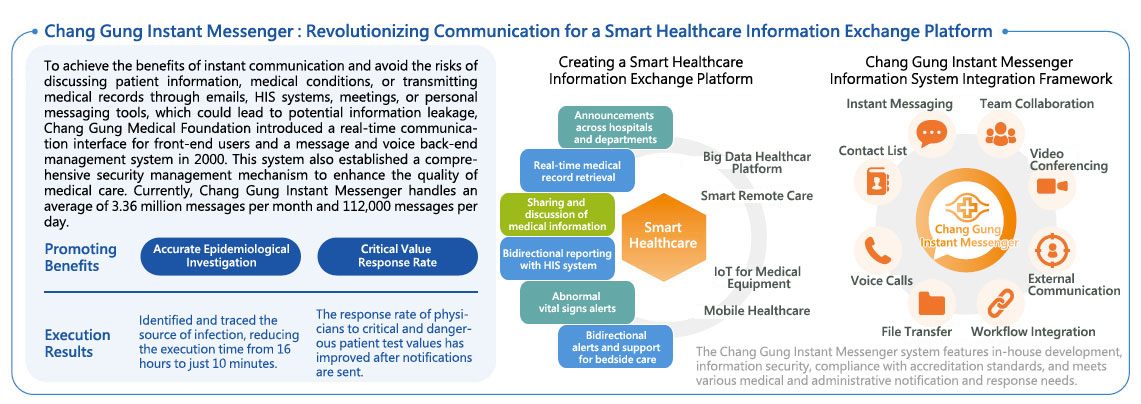Development Concept
Digital Management and Intelligent Development
Technology and Information at Chang Gung Medical Foundation
Chang Gung Medical Foundation is dedicated to leveraging information technology to integrate work, manpower, and equipment to support the operation of medical services and enhance the quality of medical services. Through the operation of administrative management, information security management, promotion of smart hospitals, and HIMSS system certification, the foundation uses "digitalization" as a cornerstone towards "intelligent healthcare," with all members participating in the promotion of Chang Gung's "intelligent healthcare system."
Information Security Management
To strengthen the hospital's information security management, Chang Gung Medical Foundation introduced the ISO 27001 information security management system, becoming the first private medical system in Taiwan to pass ISO 27001 certification. From 2021 to 2022, all hospital campuses passed the ISO 27001:2013 information security management certification. Continuous management operations will be carried out to maintain the effectiveness of information security management, with plans to promote the ISO 27001:2022 version transition according to hospital operation schedules in 2023, continuing to conduct audits and improvements accordingly.
In 2019, Linkou Chang Gung Memorial Hospital became the first hospital in Taiwan to achieve the HIMSS EMRAM Stage 7 onsite certification. HIMSS Analytics evaluates the informatization construction of medical institutions into eight levels, ranging from 0 to 7, with Stage 7 being the highest level of evaluation. In this evaluation, Linkou Chang Gung Memorial Hospital achieved the highest standards in aspects such as paperless operations, information security, closed-loop medical information management, intelligent medical management, and clinical decision support systems. This realization aids patient safety through the information-assisted medical care process, providing patients with a safer medical environment.
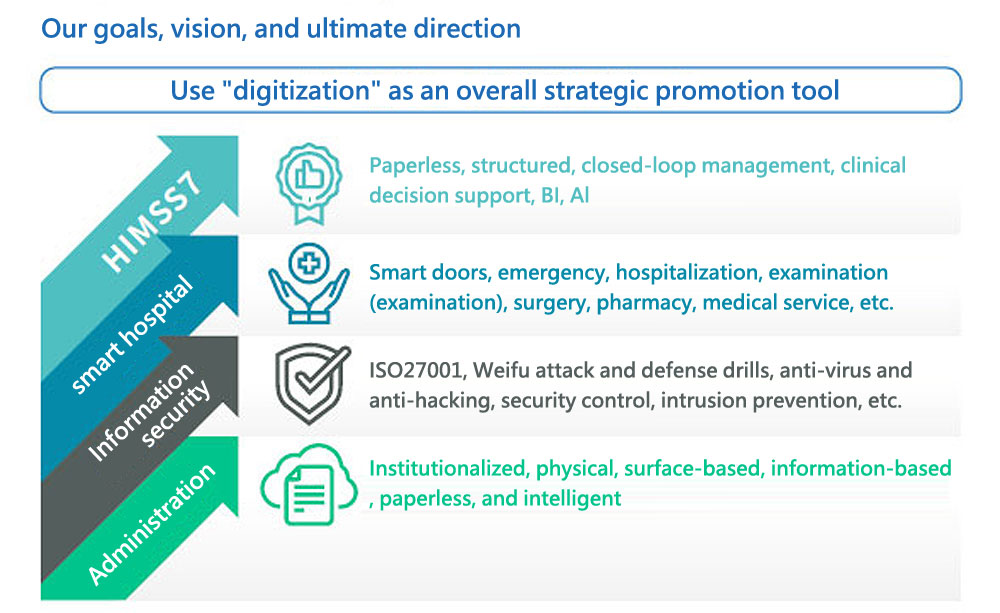
Promotion of Information Technology
To realize the vision of "intelligent healthcare," Chang Gung Medical Foundation promotes information technology-related operations, including services related to smart hospitals: smart pharmacies, AI voice customer service, AI intelligent applications for disease classification and coding framework, informationization of cell therapy, and embryo culture operations.
Additionally, the Chang Gung system has established a Hospital Information System (HIS), which is a comprehensive medical management system capable of meeting the needs of different departments. Starting in 2022, HIS has been introduced to outreach hospitals, providing cooperative hospitals with integrated services, including system training, information establishment, regulatory compliance, and sustainable services. Currently, 11 cooperative hospitals have implemented HIS.
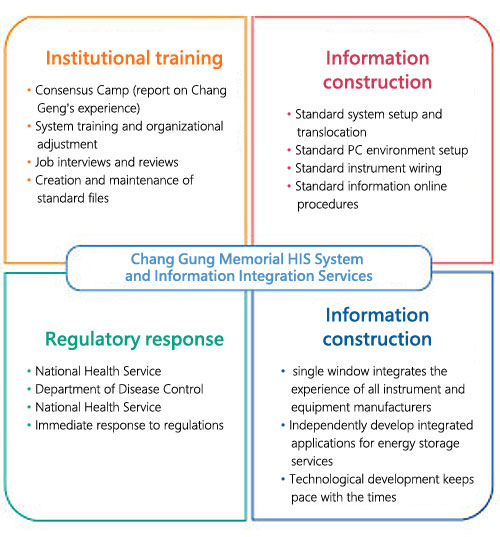
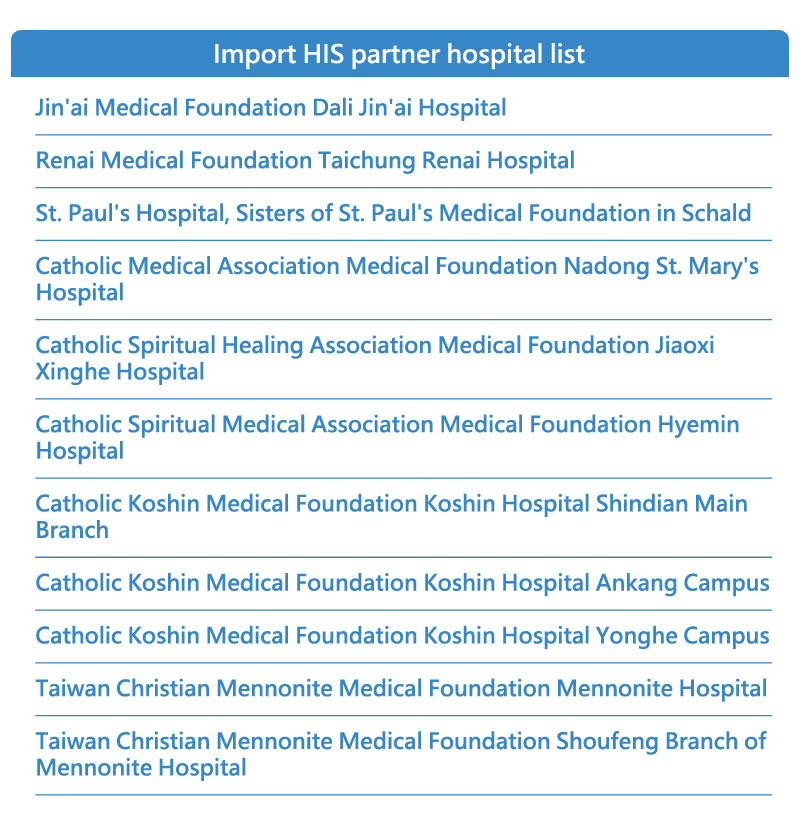
Electronic Medical Records
Chang Gung Medical Foundation has been promoting electronic medical records (EMR) since 2004, following the "Regulations for the Production and Management of Electronic Medical Records in Medical Institutions" set by the competent authority to advance paperless medical record operations. The introduction of EMR achieved a completion rate of 99% in 2022. Annually, this reduces paper usage by 140 million sheets, carbon emissions by approximately 1,000 metric tons of CO2e, and frees up 510 ping of medical record storage space, which can be repurposed for other services within the hospital. This initiative not only provides environmental and cost benefits but also allows the saved labor costs to be redirected towards patient care services, enhancing the efficiency and quality of medical work.
The hospital campuses have passed the CNS 27001 certification for electronic medical record information systems. In the future, efforts will continue to optimize the performance of EMR usage, improving the timeliness of medical record duplication. In 2022, the average time for medical record duplication was 0.57 days, a 4% improvement compared to 2021.
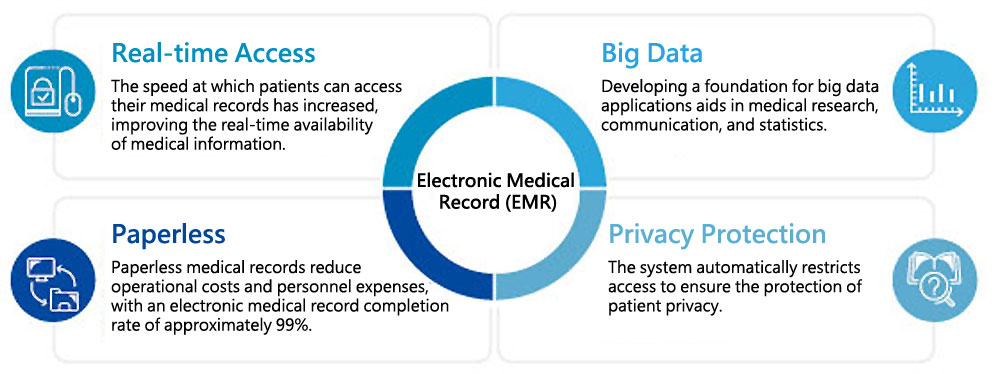
Development of Intelligent Healthcare
The development of smart hospitals is evolving from the past emphasis on the application of single-function smart medical devices to creating a fully integrated medical and intelligent application environment. This transformation effectively enhances the efficiency of medical staff in performing their duties, thereby improving the quality of care and reducing the burden on healthcare personnel.
Since 2017, Chang Gung Medical Foundation has established a project team to promote "intelligent healthcare." This initiative began with the digitalization of structuring electronic medical records and establishing a structured medical record system, moving towards creating an intelligent healthcare institution. Five major goals have been set to develop a blueprint and action plan for the advancement of intelligent healthcare. Linkou Chang Gung Memorial Hospital was the first in Taiwan to receive the Joint Commission of Taiwan's "Smart Hospital Certification" in 2014.

Smart medical application cases

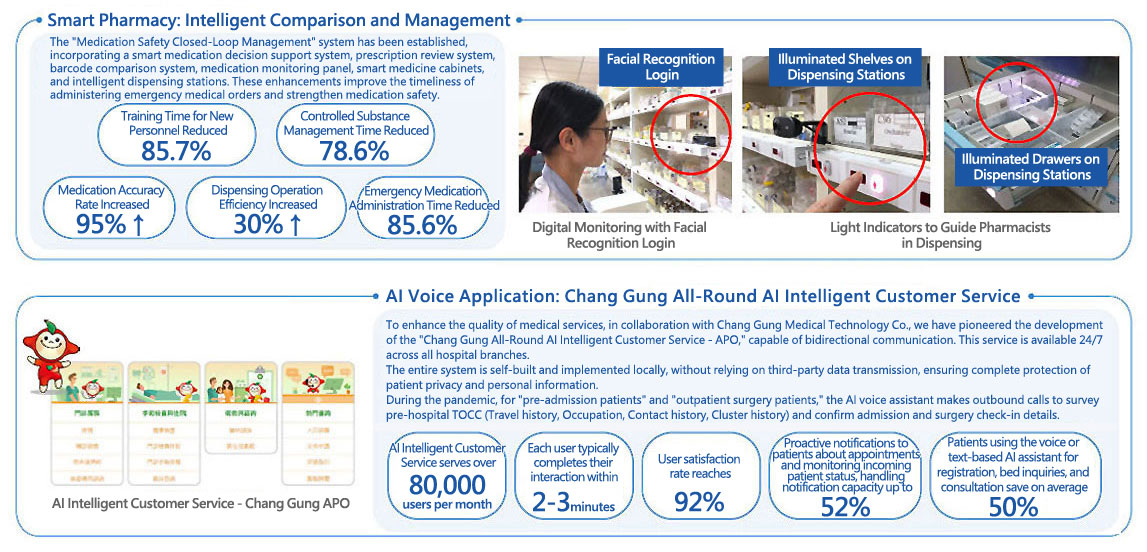
Development and Application of the AI Core Laboratory
In 2018, Chang Gung Medical Foundation established the AI Core Laboratory to effectively integrate AI resource needs, including data, manpower, clinical testing sites, funding, and technology. The foundation continues to invest in research and development projects, with a research team comprising four PhDs, six master's degree holders, and more than ten other related researchers. Cumulative R&D funding has exceeded 500 million NTD, with a total of 182 internal and external research projects executed.
Centered around the AI Core Laboratory, 13 core laboratories are collaborating to develop AI-related research. These include laboratories focused on genetic medicine, clinical proteomics, big data and statistics, clinical metabolomics, cancer vaccines and immunotherapy, genomics and proteomics, human whole genome disease research, biobanking, microscopy, cell therapy, radiological medicine, experimental animal phenotype identification and diagnosis, and valuable instruments.
The primary goal of the AI Core Laboratory is to apply AI technology to clinical medicine, assisting doctors in diagnosis, reducing human resource depletion, and improving treatment accuracy. Future plans include expanding clinical teams to support doctors in conducting clinical AI research to accelerate research progress, nurturing AI talent in both clinical and engineering fields, deepening the integration of high-speed computing and clinical systems, and further promoting 5G medical applications and research to accelerate the commercialization of AI products.
Development Work and Achievements of the AI Core Laboratory

AI in Medical Applications
| Medical application fields | Import project | Implementation results | Differences before and after AI intervention | Future clinical promotion and application |
|---|---|---|---|---|
| Counseling diagnosis | EasyPath | By completing whole cell counting and community regression, cancer FISH images are fully quantitatively analyzed to accurately screen out groups that can be treated with HER2 therapeutic drugs. | The number of people who can be treated has increased from the original 13~17% to nearly 32%. | Obstetrics and gynecology, general surgery, orthopedics, neurosurgery |
| Artificial intelligence-assisted system for lymph node metastasis of peripheral cancer | It assists pathologists in interpreting lymph node metastasis of gastric cancer and can screen whether there is lymph node metastasis of gastric cancer. The workflow significantly improves the sensitivity of identifying micro-metastasis up to 95.8% and isolating tumor cells up to 96.15%. | The pathologist's interpretation time is shortened by 31.5%. | Department of Anatomical Pathology | |
| Testing and screening | XBugHunter | Rapidly detect antibiotic resistance with the highest accuracy of 97%, sensitivity of 95%, and specificity of 97%. | The detection time is about 50% faster (about 34 hours faster) and the accuracy of antibiotic administration is improved to about 97%. | Clinical departments requiring microbial culture and antibiotic susceptibility testing |
| Ventricular systolic function screening software | Assistant physicians screen patients (static 12-lead electrocardiogram signals of adults over 20 years old) for left ventricular systolic dysfunction and arrange follow-up examinations to confirm the diagnosis. | Screening patients for left ventricular systolic dysfunction has a sensitivity of 87%, a specificity of 87%, and an accuracy of 86%. | Cardiology, cardiac surgery, emergency department | |
| Detection prediction | Wrist scaphoid fracture detection software | The structure of the wrist is complex, and it is not easy for even clinicians to achieve stable accuracy in each interpretation. The prediction output of whether the wrist scaphoid is fractured or not is immediately assisted and output to the physician, so that it can be used as a reference during diagnosis. | Rapidly detects scaphoid fractures in the wrist with a sensitivity of 88.8%, a specificity of 93%, and an accuracy of 91.1%. | Department of Imaging Medicine, Department of Orthopedics, Department of Rheumatology, Allergy and Immunology, Emergency Department |
| hip fracture detection system | Rapidly detect hip fracture sites and conduct retrospective case image verification, achieving results of 91% accuracy, 98% sensitivity, and 84% specificity. | The accuracy of auxiliary image analysis has been improved from 95% of the original manual interpretation to 99% of human-machine combined reading. | Emergency Department, Orthopedics |
Business Intelligence (BI) Applications
As the largest medical system in Taiwan, Chang Gung Medical Foundation introduced Business Intelligence (BI) into its smart healthcare blueprint to effectively manage the operations of each hospital campus. The BI system encompasses three major functions: "data integration," "data analysis," and "visualization," built on a cloud database platform. It includes eight major analytical data sets and related dashboard applications, covering infection control, clinical pharmacy, intensive care unit, emergency medicine, operational management, medical quality monitoring, obstetric and pediatric care, and disease certification. The BI technology enables the rapid aggregation of various types of data into useful information, achieving real-time monitoring and early warning of critical information for each department.

BI Application Cases
